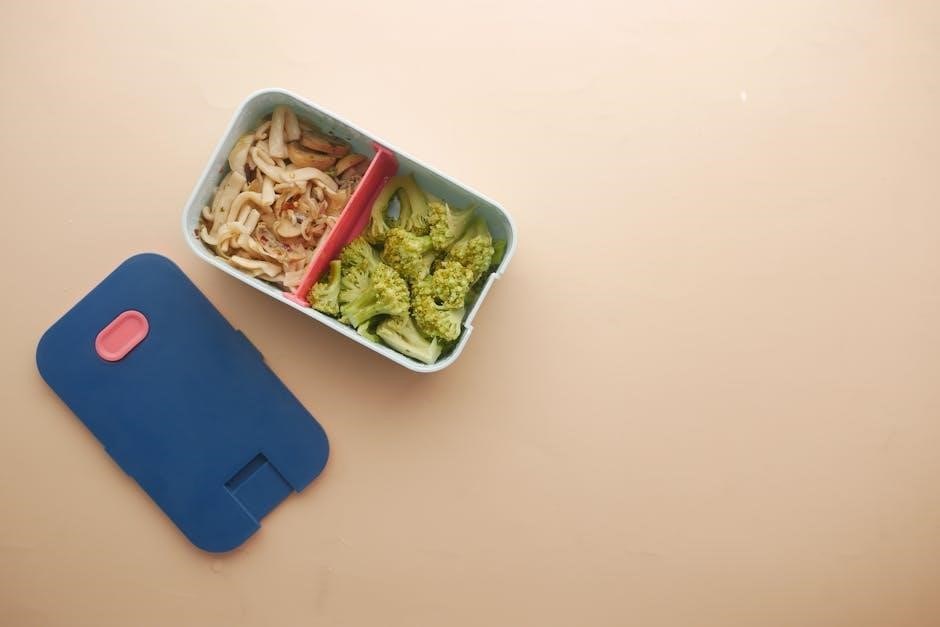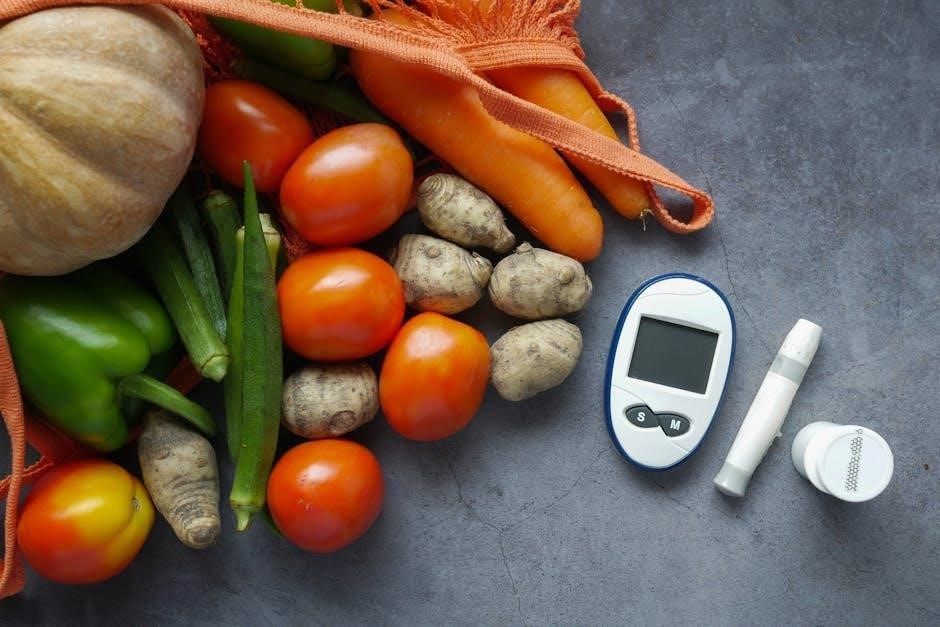
vegetarian bodybuilding meal plan pdf
Discover how a well-structured vegetarian bodybuilding meal plan can fuel muscle growth and performance. This guide provides high-protein, nutrient-rich recipes and strategies for optimal results.
Overview of Vegetarian Diet for Bodybuilding
A well-planned vegetarian diet can effectively support bodybuilding goals by providing essential nutrients, protein, and energy. It focuses on plant-based foods like legumes, grains, and dairy alternatives, ensuring muscle growth and recovery. This approach not only supports physical performance but also promotes overall health by reducing saturated fats and increasing fiber intake. A vegetarian bodybuilding meal plan emphasizes balanced nutrition, proper meal timing, and sufficient caloric intake to maintain and build muscle mass. It’s a sustainable and ethical choice for athletes aiming to optimize their physique without compromising on nutritional quality or taste.
Importance of Protein in Vegetarian Bodybuilding
Protein is crucial for muscle repair, growth, and maintenance in vegetarian bodybuilding. It helps build and repair tissues, making it essential for achieving physique goals. Vegetarian bodybuilders must consume sufficient high-quality protein from sources like legumes, dairy, and plant-based powders to meet daily needs. Adequate protein intake supports muscle recovery, prevents muscle loss, and promotes lean muscle gain. Ensuring enough protein in each meal is vital for optimal performance and body composition, making it a cornerstone of a successful vegetarian bodybuilding meal plan.
High Protein Vegetarian Foods for Bodybuilding
High-protein vegetarian foods like legumes, quinoa, soy products, nuts, seeds, and dairy alternatives are essential for muscle growth and recovery in bodybuilding diets.
Plant-Based Protein Sources
Plant-based protein sources are vital for vegetarian bodybuilders, offering diverse and nutrient-dense options. Legumes like beans, lentils, and chickpeas are rich in protein and fiber. Tofu, tempeh, and edamame provide complete amino profiles. Whole grains such as quinoa and farro contribute to protein intake. Nuts and seeds like almonds, chia seeds, and hemp seeds are excellent sources. Soy products and seitan are high in protein, while spirulina and pea protein powders offer concentrated options. These foods supply essential amino acids, making them ideal for muscle repair and growth. Incorporating them into meals and snacks helps meet daily protein needs for optimal bodybuilding success.
Legumes and Their Role in Muscle Growth
Legumes are a cornerstone of a vegetarian bodybuilding diet, offering high-quality protein and fiber. Beans, lentils, and chickpeas are rich in essential amino acids, which are vital for muscle repair and growth. These foods promote satiety and provide sustained energy, making them ideal for bodybuilders. Legumes also contain antioxidants and minerals like iron and zinc, which support overall health and immune function. Incorporating legumes into meals helps meet protein requirements without relying on animal products, making them a key component of a successful vegetarian bodybuilding meal plan.
Dairy and Dairy Alternatives for Protein
Dairy and dairy alternatives are excellent sources of protein for vegetarian bodybuilders. Greek yogurt, cottage cheese, and milk provide high-quality protein and calcium, supporting muscle growth and bone health. For those avoiding dairy, alternatives like soy milk, almond milk, and oat milk offer plant-based protein options. These products are often fortified with nutrients like vitamin B12 and vitamin D, ensuring a balanced diet. Incorporating these into meals or post-workout shakes can help meet daily protein goals while maintaining a vegetarian lifestyle. They also add variety and convenience to a vegetarian bodybuilding meal plan.
Sample Vegetarian Bodybuilding Meal Plan
A structured vegetarian bodybuilding meal plan includes protein-rich breakfasts like oatmeal with protein powder, lunches featuring quinoa salads, and dinners with tofu or legume-based recipes to fuel muscle growth and recovery.
Breakfast Options
Start your day with protein-packed breakfasts tailored for vegetarian bodybuilders. Oatmeal with plant-based protein powder and mixed berries offers a balanced mix of carbs and protein. Tofu scramble with spinach, mushrooms, and whole-grain toast provides essential amino acids and fiber. Chia pudding with almond milk and nuts is another nutritious option. Smoothie bowls with protein powder, banana, and peanut butter are quick and filling. Veggie omelets with legumes or seitan can also kickstart your muscle-building journey. These breakfasts ensure sustained energy and support muscle recovery and growth throughout the day. Incorporate variety to keep your meals engaging and nutritionally complete.
Lunch and Snack Ideas
For lunch, consider a quinoa and black bean salad with roasted vegetables, providing a mix of protein and fiber. Whole-grain wraps with hummus, spinach, and chickpeas are another great option. Lentil soup with a side of steamed broccoli offers sustained energy. Snacks like protein smoothies with almond milk, banana, and nut butter are ideal for quick nutrition. Greek yogurt with mixed berries and a sprinkle of granola is both satisfying and protein-rich. Nut butter with whole-grain crackers or veggie sticks also makes for a convenient, muscle-supporting snack. These options ensure you stay fueled and focused throughout the day.
Dinner Recipes for Muscle Recovery
Stuffed bell peppers with quinoa, chickpeas, and spinach provide a balanced mix of protein and carbs. Lentil stir-fries with tofu and mixed vegetables are rich in plant-based protein. Grilled vegetable skewers with a side of brown rice offer sustained energy. Chickpea and sweet potato curry with whole-grain naan is another hearty option. These recipes support muscle recovery while delivering essential nutrients. Incorporate protein-rich ingredients like tempeh or seitan for added muscle-building benefits. Pair meals with steamed broccoli or asparagus for a boost of vitamins and minerals, ensuring optimal recovery after intense workouts.

Caloric and Macronutrient Balance
Achieve optimal muscle growth by balancing calories and macronutrients. Aim for 1.2–2.2g of protein per kg of body weight, with carbs and fats supporting energy and recovery needs.
Calculating Daily Caloric Needs
Assess your activity level, weight, and goals to determine caloric needs. For bodybuilding, aim for a surplus of 250-500 calories above maintenance. Use a TDEE calculator for accuracy. For example, a bulking phase may require 2500-4000 calories, while cutting could be 1800-2500. Adjust based on progress and recovery. Ensure macros are balanced, with protein intake at 1.2-2.2g per kg of body weight. Track intake regularly to maintain consistency and optimize muscle growth. Fine-tune portions as needed to avoid plateaus.
Macronutrient Breakdown for Bodybuilders
A balanced macronutrient intake is crucial for vegetarian bodybuilders. Aim for 25-30% of calories from protein, 40-50% from carbs, and 25-30% from fats. Protein supports muscle repair and growth, with 1.6-2.2g per kg of body weight recommended. Carbohydrates provide energy for workouts, focusing on complex sources like oats, quinoa, and whole grains. Healthy fats, such as avocados and nuts, support hormone production. Adjust ratios based on goals—higher carbs for bulking or lower for cutting. Ensure variety in protein sources, including legumes, tofu, and dairy alternatives, to meet daily targets and optimize performance. Tailor your plan to individual needs for best results.
Supplements for Vegetarian Bodybuilders
Supplements like plant-based protein powders, creatine, and digestive enzymes support muscle growth and recovery. They fill nutritional gaps and enhance performance in a vegetarian diet plan.
Protein Powders and Their Benefits
Plant-based protein powders, such as pea, hemp, and brown rice, are excellent substitutes for animal-derived proteins. They offer high digestibility and are rich in essential amino acids.
These powders support muscle repair and growth, making them ideal for post-workout recovery. They are versatile and can be easily incorporated into smoothies or oatmeal for added nutrition.
Vegetarian bodybuilders often rely on protein powders to meet daily protein goals, ensuring they maintain muscle mass and strength without compromising their dietary preferences.
Other Essential Supplements for Muscle Growth
Beyond protein powder, vegetarian bodybuilders can benefit from other key supplements. Creatine is a top choice, enhancing strength and endurance during workouts.
Branched-Chain Amino Acids (BCAAs) support muscle recovery and reduce soreness. Omega-3 fatty acids, found in flaxseeds or algae oil, aid inflammation reduction and overall health.
Vitamin B12 and iron supplements are crucial for energy and oxygen delivery to muscles. Additionally, digestive enzymes can optimize nutrient absorption, especially from plant-based foods.
These supplements complement a well-planned diet, ensuring all nutritional needs are met to support muscle growth and recovery effectively.

Post-Workout Nutrition
Post-workout nutrition is vital for recovery. Include a mix of protein and carbs within 30 minutes of exercise. Options like a protein shake, banana with nut butter, or a smoothie with protein powder and berries support muscle repair and energy replenishment.
Optimizing Recovery with Vegetarian Foods
Post-workout recovery is enhanced with nutrient-dense vegetarian foods. A protein shake with plant-based protein powder, combined with complex carbs like whole grains or fruits, replenishes energy stores and supports muscle repair. Incorporate anti-inflammatory foods such as berries, turmeric, and ginger to reduce muscle soreness. Healthy fats like nuts, seeds, or avocado aid in nutrient absorption. Timing is crucial—consume recovery nutrition within 30-60 minutes after training. Additionally, consider supplements like digestive enzymes to optimize nutrient uptake and minimize bloating, ensuring your body recovers efficiently for the next workout.
Meal Timing and Frequency
Eating 5-6 balanced meals daily supports muscle growth. Space meals every 2-3 hours to maintain metabolism and energy levels, optimizing protein synthesis and recovery.
How Often to Eat for Muscle Gain
Aim for 5-6 meals per day, spaced every 2-3 hours, to maintain a positive nitrogen balance and support muscle growth. This frequency ensures consistent amino acid availability, promoting protein synthesis and recovery. Include a mix of protein-rich foods, complex carbs, and healthy fats in each meal. For vegetarian bodybuilders, this may include plant-based proteins like legumes, tofu, and quinoa. Additionally, consider post-workout nutrition within 30-60 minutes of training to maximize recovery. Proper hydration and portion control are also crucial for optimal results, ensuring you meet your caloric and macronutrient needs without overeating.

Digestion Tips for High Protein Diets
Managing Digestive Issues
High-protein vegetarian diets can sometimes lead to digestive discomfort. To manage this, include fiber-rich foods like whole grains, fruits, and vegetables to support gut health. Drinking plenty of water and incorporating probiotic-rich foods such as yogurt or kefir can also aid digestion. Additionally, consider taking digestive enzymes before meals to break down proteins more efficiently, reducing symptoms like bloating and gas. A balanced approach ensures optimal nutrient absorption and prevents digestive issues, making your bodybuilding journey smoother and more sustainable. Proper digestion is key to maximizing muscle recovery and growth.

Tracking Progress
Monitor muscle growth and overall progress using tools like progress photos, body measurements, and strength tracking. Regularly assess these metrics to ensure your meal plan is effective and adjust as needed for optimal results.
Tools for Monitoring Muscle Growth
Effectively track muscle growth with tools like progress photos, body measurements, and strength assessments. Use apps such as MyFitnessPal to log meals and ensure nutritional goals are met. Regularly monitor weight and body fat percentage to assess progress. Keep a workout journal to record lifts and reps, helping identify improvements in strength and endurance. These tools provide valuable insights, enabling adjustments to your vegetarian bodybuilding meal plan for optimal muscle development and performance. Consistent tracking helps maintain accountability and ensures you’re on the right path to achieving your fitness goals.